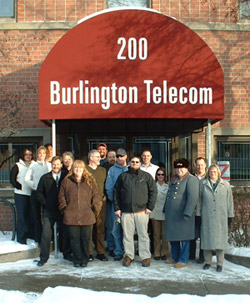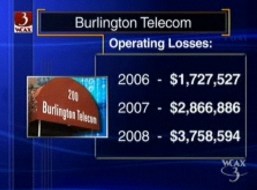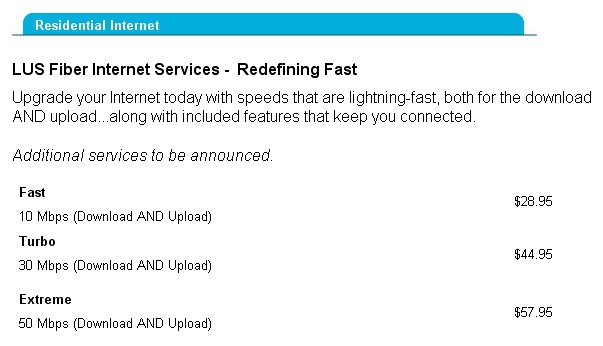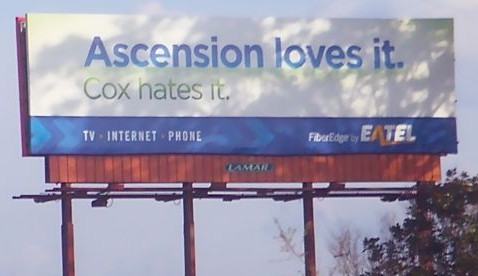 Burlington Telecom (BT), the city owned-and-operated fiber-based cable, broadband, and telephone provider is mired in debt and is not financially viable in its current form.
Burlington Telecom (BT), the city owned-and-operated fiber-based cable, broadband, and telephone provider is mired in debt and is not financially viable in its current form.
Those are the findings of a “blue ribbon” committee tasked with answering questions about the future of the financially-troubled municipally-owned provider serving 4,600 Burlington customers in Vermont.
In an 11-page public report, the committee recommended the city partner with a commercial entity that would assume a majority interest in BT. As a minority stakeholder, the city could eventually recoup the 17 million dollar investment it has made in the company.
Although some residents have lobbied the city to abandon the 100 percent fiber network to stem ongoing losses, the committee advised against it.
“The city has a considerable asset in BT, and should not give this asset away at a fire sale price,” notes one independent consultant working with the committee. “BT is too important to be jettisoned, in part because it keeps the competition honest.”
But carrying forward as-is is not a good idea either, the report concludes.
“BT is not viable in relationship to its current debt load of $51 million and its ability to generate earnings to repay this debt. BT cannot meet its principal and interest obligations at this time,” the committee concluded, noting that the company’s current business plan can’t meet future financial challenges either.
As if to underscore that notion, BT this month asked the city of Burlington for a $386,000 loan from to make an interest payment to CitiLeasing by Wednesday, to prevent the company from technically defaulting on its $32 million municipal lease purchase. On Friday, a judge issued a restraining order forbidding such a loan unless the Vermont Public Service Board agrees.
The committee noted that the reasons for BT’s financial problems weren’t rooted in its “first-class” fiber optic network, or its usefulness to the city.
In summary, the committee and its consultants blamed the problems on these factors:
- HBC found BT overpaid for its fiber network, spending $1,000 per home passed, when fiber build-out prices have dropped in the past few years.
- BT is spending too much money on customer installations. HBC reports BT could save more than $600 off the $1,600 the company pays to hook up each customer.
- The company uses the same door-to-door marketing company Comcast uses to get new customers. Additionally, BT contracts with a third party service company to handle installations and service calls. This work should be done in-house, HBC recommends, as paying a company based on how many installations are performed provides a built-in incentive to cut corners and quality.
-
BT’s broadband products are too slow for a compete, handing incumbent cable provider Comcast an unnecessary competitive advantage. Fiber can blow cable modem service out of the water when competing on speeds, but BT foolishly charges too much money for too slow service topping out at just 8Mbps/8Mbps, for a whopping $71.80 a month. BT calls that “the ultimate Internet experience.” It’s not. HBC predicts broadband will become BT’s most important service, so it is critical for the company to make the product more attractive to customers.
-
BT is mired in politics that has nothing to do with its service to the community, and it creates unnecessary distractions that commercial providers do not have. Some who oppose the municipal fiber project or the current city council use BT as a political football.
-
Because it is a public entity, too much financial and strategic business information is open to public review, which includes BT’s competitors. That gives Comcast and FairPoint advance notice of BT plans, pricing, and growth strategies. Restructuring as a semi-private entity under local government oversight would help guarantee competitive business information stays out of the hands of the competition.
-
BT lacks an effective marketing strategy to convince residents and businesses to change providers. Without a compelling lineup of services, and a marketing effort to sell them, customers will be reluctant to go through a disruptive switch to BT service. The provider’s bundled service packages are often compelling (a triple play with basic television and phone service only costs $89 a month, less than $20 more than standalone broadband service), but they often lack the services, speed, and channels consumers want.
-
The company does not pay enough attention to customer service strategies. Customers complain BT does not accept cash payments from walk-up customers, who are told to return with a money order. From a confusing automated attendant that answers customer calls to inconvenient hours and appointment scheduling, BT needs to hire marketing experts to help restructure how it serves potential and subscribing customers.

Burlington Telecom's fiber broadband speeds are the same uploading and downloading, but there is plenty of room for improvement in speeds at a lower price
- BT utilizes a 200-megabit backbone at a cost of $6,000 a month and a 350-megabit backbone at a monthly cost of $16,331. It is HBCs belief that backbone costs can be reduced considerably, as much as $6,000 per month should be saved through re-negotiation. Costs should be in the neighborhood of $25 to $30 per megabit, as compared to the $40 per megabit of speed now being paid by BT. HBC buys twice as much bandwidth per month than BT and pays only $7,000 more for the additional capacity.
-
Finally, the company leaves a lot of potential earnings on the table. It doesn’t provide local-ad insertions on cable channels and doesn’t leverage its excess broadband capacity with businesses by selling them web hosting, co-location, and speed critical services. It doesn’t provide value-added services that cable companies now offer, such as caller ID on TV.
The Burlington mayor, Bob Kiss, expressed skepticism at some of the conclusions in the committee’s findings.
Kiss believes refinancing BT’s debt would give the telecom company more time to implement better marketing and service improvements, which could attract new customers and revenue.
For Burlington business leaders, the entire affair is an embarrassment. Many believe significant harm will come from a city gaining a reputation for defaulting on its obligations.
The conclusion many have reached is that Burlington Telecom was naively planned, without sufficient regard to realistic projections of expenses and revenues, and lacks expertise to effectively compete with other local providers. Building an advanced fiber network for your community is only as good as the services offered at a price that makes sense. Alienate customers with ineffective marketing or out of touch product packaging, and your future will be in doubt.
[flv width=”368″ height=”228″]http://www.phillipdampier.com/video/WCAX Burlington Telecom Saga 12-15 02-01 02-05 02-11-2010.flv[/flv]
<
p style=”text-align: center;”>WCAX-TV in Burlington has followed the BT saga for months. This video includes five reports covering the company’s future viability (13 minutes)
- Burlington Telecom Saga Continues (12-15-2009)
- Burlington Telecom Forces Changes In Burlington City Government (02-01-2010)
- Burlington Telecom Not Financially Viable (02-05-2010)
- Burlington Council Gets Blue Ribbon Committee Report (02-11-2010)
- Burlington Telecom’s Fate Under Discussion (02-11-2010)
[flv]http://www.phillipdampier.com/video/WFFF Burlington Burlington Telecom’s Future Unclear 02-11-2010.flv[/flv]
WFFF-TV in Burlington reports the telecom company’s future is unclear. (1 minute)
[flv width=”640″ height=”500″]http://www.phillipdampier.com/video/WPTZ Plattsburgh Burlington Telecom Not Viable.flv[/flv]
WPTZ in Plattsburgh covered the contention over an upcoming interest payment BT needs to pay by Wednesday. (3 minutes)
Read our complete coverage on Burlington Telecom.


 Subscribe
Subscribe








